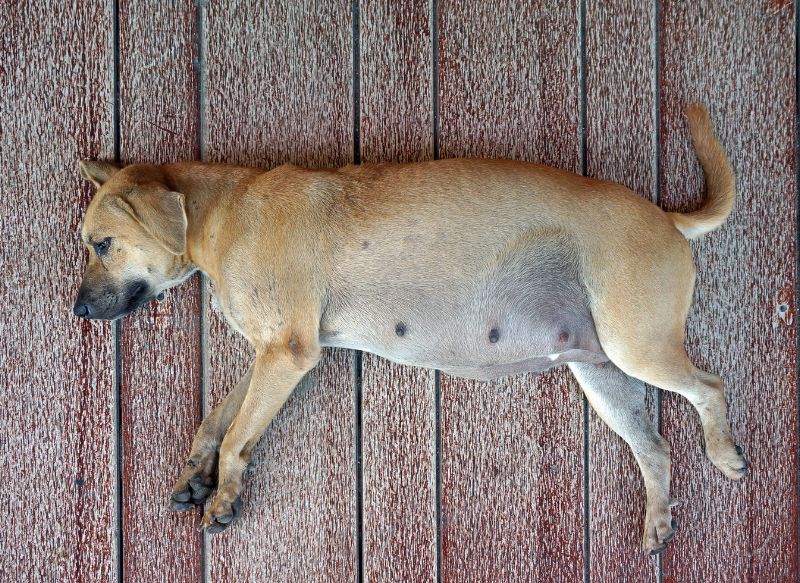Busselton Vet Hospital Library
Dog Whelping

Learn About the Different Stages of Giving Birth
The pregnant bitch needs special care and attention as the due date approaches. A quiet room should be designated as the whelping room, and a whelping box can be set up, which should be large enough for the bitch to stretch out comfortably and have room for a litter of puppies. The sides should be high enough so that 4-6 week old puppies cannot jump out, but the bitch can jump out easily. A ledge around the inside of the box is ideal and prevents the bitch from accidentally crushing a puppy between herself and the wall of the box. Soft, warm bedding should be provided. The bitch should be fed in the room and become familiar with the box 2-3 weeks prior to whelping.
Monitoring rectal temperature 2-3 times daily from day 58 of pregnancy onwards is useful to help predict parturition (the birth), as a drop in the temperature to less than 37º C will be seen 18-24 hrs prior to whelping.
Stage 1
This stage begins with the onset of uterine contractions and ends when the cervix is fully dilated. Contractions of the uterus at this stage are usually not visible externally. This stage averages 6-12 hours but can last up to 24 hours (especially in nervous first-time bitches). The bitch may appear restless and nervous, stop eating and may be seen to shiver, pant, vomit, chew and scratch at the floor, or pace. Most dogs seek seclusion and/or exhibit nesting behaviour (e.g., digging and/or tearing material to create a nest). As an owner, you should provide your bitch with some privacy and an area for whelping.
Stage 2
Stage 2 begins with full dilation of the cervix and ends with complete expulsion of the foetus. The placenta may rupture (‘waters breaking’), and there will be obvious abdominal straining.
The time from initiation of Stage 2 and birth of the first puppy is commonly 10-30 minutes and should be within 4 hours.
Indications that you should seek urgent veterinary attention:
- Active, unproductive straining for more than 20-30 minutes
- A period greater than 1-2 hours between puppies
- There is any green discharge from the bitch’s vulva before the puppies are born (placentae may be separating)
- If the bitch seems in pain or distress
Approximately 40% of puppies are born in a breech position; this is considered normal in the bitch.
Sometimes a disturbed, frightened, or nervous bitch will stop whelping just because they are so nervous, so it is important to set her up in a quiet, comfortable, and familiar space.
Stage 3
Stage 3 is the expulsion of the placenta, which normally happens with each puppy as it is born. Some animals may eat the placenta.
Once the bitch is settled and there is no more straining, then she is probably finished. Normal discharge from the vulva can occur for 1-3 weeks post-whelping.
The Birth & Beyond
As each pup is born, it is surrounded by a yellowish sac (the chorioallantoic membrane) which may rupture during the birth, or the bitch bites and licks the membrane away. The placenta is usually passed within 5-15 minutes of the birth of each puppy.
The bitch should lick each newborn vigorously to remove all membranes from the face and to promote respiration, if this does not occur within 1-3 minutes the owner can intervene by removing the membranes, placing the puppy in a warm, dry towel and rubbing vigorously.
The bitch usually severs the umbilical cord with her teeth. If this is not done, tie some cotton around the cord and cut ½ cm below this (away from the puppy). The severed end can be dipped in a mild betadine or salt solution (do not use Dettol).
The pups should be left with the bitch and handled as little as possible.
The bitch may eat the placentas, although there is no known benefit, so they may be taken away as vomiting the placental material is common.
The uterus slowly regresses to its normal size 4-6 weeks after whelping. During this time, an odourless green, dark red/brown, or obviously bloody vaginal discharge called Lochia may be seen. This is normal as long as the bitch is not sick at all. The amount can vary between dogs. Most bitches will stop discharging within the first week.
Puppy Care
The pups are easy to sex at birth as dogs have an obvious penis and bitches an obvious vulva.
It is always a good idea for the bitch to have a health check-up 3-5 days post-whelping. At this time, we can also check the pups for congenital defects.
The bitch should have enough milk to feed the puppies in the initial weeks. If there is a large litter or the bitch is not strong, then the puppies may need to be supplemented with a milk formula. Please phone and discuss this aspect if you are worried. If the puppies are content and sleep after a meal then they are usually getting enough milk.
You can start introducing solids to the pups from 3-4 weeks of age. Advance Puppy Rehydratable biscuits soaked in puppy milk or water are an ideal first food.
The puppies will be due for their first vaccinations at six weeks of age. Do not be tempted to introduce them to dogs outside your household or take them out of your house/’yard before they have been vaccinated.
Puppies should be wormed weekly for the first six weeks. Always weigh the puppies first as they grow surprisingly quickly.
Always watch the puppies and bitch closely for fleas. Treating the bitch with a recognised product (e.g., Revolution, Frontline, or Advantage) will also afford the puppies some protection.
Heartworm treatment for the puppies can be started at their second vaccination at nine weeks of age.
Good luck, and we hope you enjoy the wonderful experience of dog breeding trouble-free.
If you have any other questions or problems, please feel free to phone the hospital for advice at (08) 9752-1433.
We provide a 24-hour emergency service (bitches often whelp at night). Phone (08) 9752-1433 anytime and follow the prompts.

